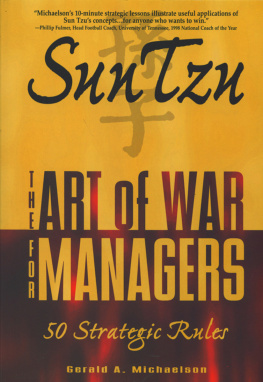Frank L. Hung, Chairman
Harvard Management Services, Inc.
Taipei, Taiwan
Translations available in German, Japanese, Korean, and Spanish.
Acknowledgments
As always, Steven and Deanne provided ideas while Jan supported my interest in the strange hobby of searching for business applications from military strategy.
With thanks for the world-class performance of Sandy Belcher, a talented and tireless editor who gets everything right.
Jere Calmes, Jeff Cowell, Carl Glass, Trent Price, Townes Osborn, and Steve Rivkin gave awesome advice concerning major changes in format and content.
My thanks to many friends who offered ideas and input during the eight years of intermittent writing and rewriting of this book. The most recent helpful contributions were offered by Roger Bean, Tim Carpenter, Suzzane Dupes, Tom Gordon, Frank Hung, Erny James, Ed Miles, Irving Mills, Vergil Metts, Allen Pannell, John Shamley, Chuck Sawyer, and Jerry Sentell. My apologies to those I may have missed.
Thanks to friends in Beijing: Zhai Zhihai who introduced me to the new translation, Mr. Chen Yingming for his gracious assistance in arranging contacts, and Ms. Wu Ying for making arrangements with Mr. Chen Shufang, who gave approval on behalf of his publishing house to use this translation of The Art of War.
The Lesson of the Concubines
The following story is considered to be of dubious authenticity and not part of the 13 chapters. Some translators include it within their books; others ignore its existence. All narratives are quite similar. You may find interesting lessons in the following version.
Sun Tzu's book, The Art of War, earned him an audience with the King of Wu, who said, I have thoroughly read your 13 chapters. May I submit your theory of managing soldiers to a small test?
Sun Tzu replied, Sir, you may.
The King of Wu asked, Can the test be applied to women?
Sun Tzu replied that it could, so arrangements were made to bring 180 beautiful women from the palace. Sun Tzu divided them into two companies with one of the King's favorite concubines at the head of each. He then made all of them take spears in their hands and spoke to them: I presume you know the difference between front and back, right hand, and left hand?
The women replied, Yes.
Sun Tzu continued, When to the sound of drums I order 'eyes front,' look straight ahead. When I order 'left turn,' face toward your left hand. When I order 'right turn,' face toward your right hand. When I order 'about turn,' face around to the back.
After the words of command had been explained, the women agreed they understood. He gave them spears so he could begin the drill. To the sound of drums, Sun Tzu ordered 'right turn.' In response, the women burst out in laughter.
With great patience, Sun Tzu said, If the instructions and words of command are not clear and distinct, if orders are not thoroughly understood, then the general is to blame. He then repeated the explanations several times. This time he ordered the drums to signal 'left turn,' and again the women burst into laughter.
Then Sun Tzu said, If the instructions and words of command are not clear and distinct, if orders are not thoroughly understood, the general is to blame. But if commands are clear and the soldiers disobey, then it is the fault of the officers. He immediately ordered the women who were at the head of the two companies to be beheaded.
Of course, the King was watching from a raised pavilion, and when he saw that his two favorite concubines were about to be executed, he was alarmed and swiftly sent down a message: We are now quite satisfied as to the general's ability to manage troops. Without these concubines, my food and drink will not taste good. It is the King's wish that they not be beheaded.
Sun Tzu replied, Having received the sovereign's commission to take charge and direct these troops, there are certain orders I cannot accept. He immediately had the two concubines beheaded as an example and appointed the two next in line as the new leaders.














